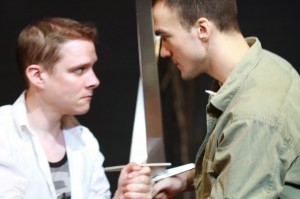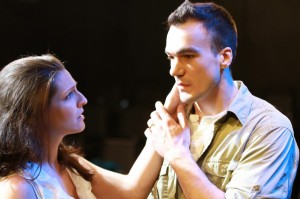Shakespeare's Macbeth is as topical this month as year-end bonuses and the holiday windows at Saks Fifth Avenue. Ethan Hawke is giving a much-discussed performance in the title role at Lincoln Center. The entertainment press is trumpeting a film adaptation, featuring Michael Fassbender and Marion Cotillard, which begins shooting immediately after New Year's. The Park Avenue Armory has announced that Sir Kenneth Branagh will make his New York stage debut next summer in a highly praised production of the play seen earlier this year at the Manchester International Festival in England. And Punchdrunk's Sleep No More, the "immersive" entertainment inspired by the Shakespearean tragedy, is in the third year of an open-ended run down in Chelsea.
Less publicized — and somewhat off the beaten path — is another Macbeth, which is being presented by What Dreams May Co. Theatre and features non-traditional casting. (The company appears committed to equal opportunity for women, despite the disproportionate number of male roles in the Shakespearean canon.) This fleet, streamlined production of Shakespeare's most compact tragedy is at the 133rd Street Arts Center in Harlem through Dec. 21.
Macbeth was first performed early in the reign of King James I of England (1603-1625) by The King’s Men, a London troupe of which Shakespeare was a member. Since the King was also James VI of Scotland, his accession, upon the death of Elizabeth I, united the crowns of the two nations. Shakespeare likely intended the play to curry favor with the monarch; his depiction of Banquo, an ancestor of the King, as a virtuous man whose children are destined to be kings appears to be an oblique defense of James's divine right to the thrones of both countries.
Macbeth, in the words of G. Wilson Knight, is "Shakespeare's most profound and mature vision of evil." At the beginning of the play, the title character (Alan Brincks), a near relative of King Duncan of Scotland, encounters a group of witches who predict that he will become king but that the descendants of his friend Banquo (Lindsey Zelli) will ultimately occupy the throne. Spurred by his ambitious wife (Nicole Schalmo), Macbeth kills Duncan (Joshuah Laird) to make the witches' prophecy come true. Murder follows murder as Macbeth tries to conceal his crimes. Hoping to secure the royal succession for his own family, he has Banquo killed. But Banquo’s son, Fleance (Zoe Sjogerman), and Malcolm (Vince Reese), Duncan's rightful heir, flee the country and survive the brief, bloody interregnum of King Macbeth.
In a program note, director Christina Sheehan describes Macbethas “an adrenaline rush of a play”; and her swift-paced direction, utilizing every inch of the auditorium's tiny playing area, keeps the actors on the move and the audience wide awake. The cast — 12 talented Millennials, five of them playing two or three roles — is consistently adept with Shakespearean verse. Brincks and Schalmo, an imposing pair with ample on-stage chemistry, play the Macbeths as besotted with each other and mutually aroused by the prospect of power. As Banquo, Zelli is the embodiment of rectitude and her cross-gender casting works well. Jonathan Emerson is a volcanic Macduff, infuriated by the murder of his king; crushed by the slaughter of his wife and children; determined throughout that justice will be done. The Act IV scene in which Emerson's Macduff goads Reese's Prince Malcolm to avenge his father's death and reclaim the throne for his family is the production's most emotionally powerful point.
Though the playbill lists no credits for scenic, costume, or lighting design, someone has made wise choices in each of those departments. The players work on a largely unadorned stage, furnished with chairs and a few props. A fanciful banner brings Great Birnam Wood "to high Dunsinane hill" simply but with theatrical flair. The theater's lighting equipment, though rudimentary, is deployed to suitably eerie effect. The actors wear street clothes with a few adroitly designed enhancements — spooky hooded cloaks for highwaymen and supernatural figures; richly colored sashes for the royals; and a couple of sheets of silky, scarlet fabric representing battlefield casualties and the blood of murder victims. Reese, doubling as fight director, has choreographed a compelling final scene, and the actors wield their weapons convincingly in all episodes of combat.
The cast of this Macbeth is mature enough to meet the technical challenges of Shakespeare's text and young enough to lend a hip quality to the proceedings. The entertaining result supports Mary McCarthy’s assertion, half a century ago, that “bloodstained Macbeth, of all Shakespeare’s characters” seems “the most ‘modern’” and the most readily transposed "into contemporary battle dress or a sport shirt and slacks.”
Macbeth by William Shakespeare presented by What Dreams May Co. Theatre, 308 West 133rd Street between St. Nicholas and Frederick Douglas Boulevard in Harlem, runs Fridays and Saturdays at 8 p.m., and Saturdays and Sundays at 3 p.m. through Saturday, Dec. 21. Tickets: $18. Running time is two hoursn including one intermission. Tickets may be purchased by visiting www.brownpapertickets.com/event/495842 or calling 1-800-838-3006.



